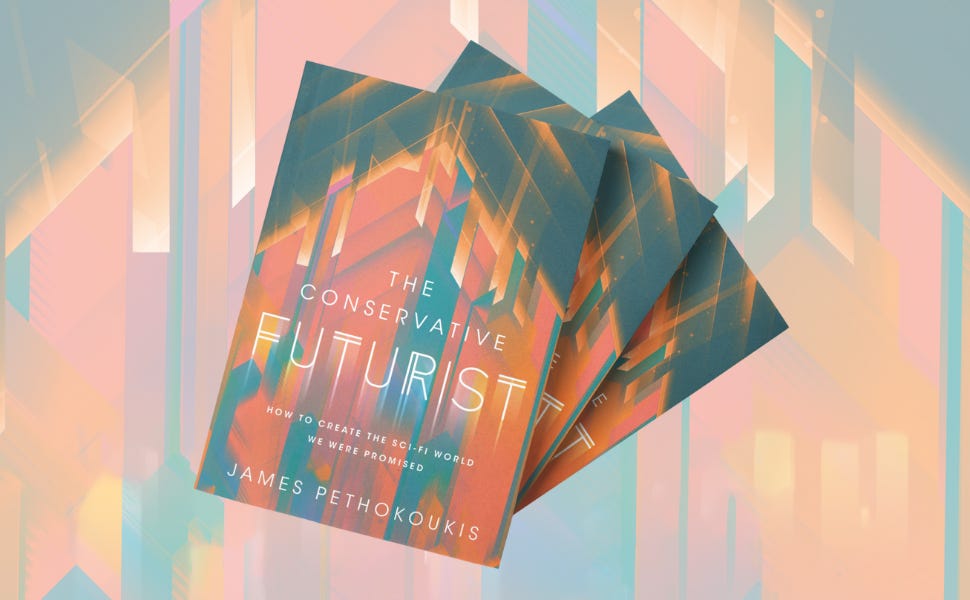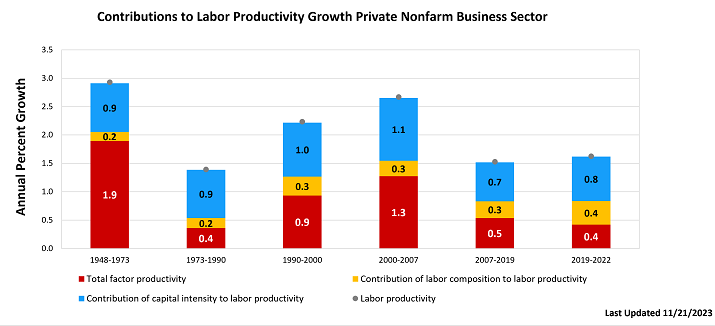🃏 AI solves famous math problem. Bigger breakthroughs to come?
Knowledge discovery is what could really turbocharge technological progress and economic growth
Quote of the Issue
“The end might not be in sight for theoretical physics. But it might be in sight for theoretical physicists.” - Physicist Stephen Hawking on the impact of growing computer power applied to his field
I have a book out: The Conservative Futurist: How To Create the Sci-Fi World We Were Promised is currently available pretty much everywhere. I’m very excited about it! Let’s gooooo! ⏩🆙↗⤴📈
The Essay
🃏 AI solves famous math problem. Bigger breakthroughs to come?
When you consider that the US productivity growth — the main, long-term driver of rising living standards — has been in a 50-year funk, any help in changing that reality should be greatly appreciated. And already it seems promising that generative AI will provide some needed assistance.
One example: A Stanford and MIT study found that GenAI tools like chatbots increased productivity by 14 percent on average among over 5,000 customer support agents, based primarily in the Philippines. at a Fortune 500 company. Notably, this productivity boost was most significant for novice and low-skilled workers, with a 35 percent increase in work speed.
Now that’s just one real-world study, but it suggests the vast potential of GenAI models as they diffuse across all sectors of the US economy. As economist Erik Brynjolfsson, one of the study’s authors, told Fortune magazine:
I see a coming productivity boom. I see about a doubling of productivity growth in the coming decade as a result of these technologies. It's not as simple as just buying the software or hardware. General purpose technologies like electricity, the steam engine, early computers, often take a decade or more to translate into significant productivity gains because of all the changes you have to make in business processes and rescaling. This time it's definitely happening faster. … For a lot of the problems we have—the federal budget, health care, these big, nagging problems—productivity is like an elixir that makes all those problems much more solvable.
A doubling of the rate of productivity growth since the mid-2000s would mean a return to something like the rapid productivity pace we saw during the technology boom just before and after the year 2000. Which would be awesome for all sorts of reasons, from faster wage growth to making it easier to tackle all sorts of fiscal issues.
But what if could do better than a doubling? As I wrote earlier this week, the most exciting scenario is one of “explosive growth” where AI tools able to independently drive scientific and technological, adding the equivalent of billions of researchers. As a new report from asset-management firm Bridgewater Associates puts it: “The resulting growth would compound, as AI-powered researchers could further improve AI technology, and the rapid economic growth their inventions catalyze would make it possible to direct more resources toward creating even better AI tools.”
Whether as a super research assistant or super scientist, this promise of putting a massive increase in cognitive power and speed to work on knowledge discovery suggests the true upside of AI advancements. Thankfully, some recent headlines suggest this scenario isn’t totally science fictional:
“AI breakthrough could help us build solar panels out of ‘miracle material’, scientists say” - The Independent
“Google AI and robots join forces to build new materials” - Nature
“How AI That Powers Chatbots and Search Queries Could Discover New Drugs” - WSJ
“AI-discovered drugs will be for sale sooner than you think” - Vox
“AI Accelerates Ability to Program Biology Like Software” - WSJ
“DeepMind Has Trained an AI to Control Nuclear Fusion” - Wired
Perhaps one of the most tantalizing examples of knowledge discovery is a new one from Google’s Deep Mind:






